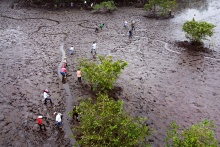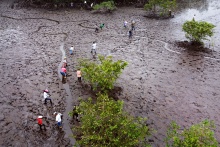It is seven a.m. in Tumaco, a coastal municipality in Nariño, Colombia. Anabel Magallanes walks through the mudflats of the mangrove forest in low tide, looking for piangua or concha – a nutrient-rich mollusk that is native to this area and used in the traditional cuisine of southwestern Colombia.
In the Pacific coast of Colombia, guardians of the mangrove sow seeds of change
shows members of of the organization ACOPI Nariño, a partner of
the ‘Raices’ initiative, working to restore the Mangrove forest by
planting seedlings and removing waste. Photo: ACOPI Sectional Nariño
“We arrive in the morning, we do a ritual, asking the mangrove for permission to collect [piangua],” shared Magallanes. “It takes us between three or four hours, depending on the rise of the tide, since the shells are found in the mangrove. We return to our homes and do a cleaning process to sell it locally or to make a traditional dish.”
Magallanes is part of a group of “conchera women” (shell women) in Tumaco, who have hand-collected, sold, and cooked piangua for generations. The shell-shaped mollusks that live around the roots of the mangrove trees are an important source of income for the local community, and part of their ancestral cuisine. However, deforestation of the mangroves puts the piangua at risk. Locals estimate that piangua harvesting has reduced by 40 per cent in recent years.
harvests artisinally in Tumaco, and a painting representing the
estuaries full of mangroves where they are harvested.
Photo: UN Women/Luis Ponce
Most piangua collection is done by women, who watched and learned sustainable ways of harvesting and processing it from other women in their families and communities. They also understand the importance of conservation of the mangroves so that piangua can thrive.
Through the “Roots: Women Sowers of Change” programme led by UN Women, with funding from the Government of the Republic of Korea, and in coordination with the Colombian government and UNFPA, two local organizations – Raíces del Manglar and Asopezconcha – are supporting local women’s economic empowerment and conservation of the mangroves.
Culture and conservation go hand in hand in Tumaco
Nearly 100 conchera women have planted 6,000 mangrove seedlings, helping with the recovery of three hectares of mangrove forests. Mangroves act as a natural filter to purify water, benefiting the entire community.
Magnolia Ordoñez of the Raíces del Manglar Association started collecting piangua when she was seven years old. Today, she is 53, and still a conchera woman, helping with mangrove conservation and keeping the piangua traditions alive.
“For me the mangrove represents a connection… it is also our family, and that is why we want to clean and protect it,” said Ordoñez.
conchera – a collector of pingua, a shelled mollusk found among
the mangroves in the Pacific costal town of Tumaco, Colombia.
She collects pingua not only to provide for her family with the sale
of this mollusk, but also as part of local tradition and culture. Photo: UN Women/Luis Ponce
Eco-friendly efforts to boost women’s income and leadership
Ordoñez and others spend around 18 hours every week to clean and reforest mangroves and collect piangua. Some men have joined the group to handle transport boats and help women with loading the harvest. The shell women receive one million Colombian pesos (approximately USD 256) every month, which provides some supplementary income.
Tumaco has seen much unrest due to the presence of armed and illegal groups, which has impacted women’s lives and livelihoods. Unperturbed by the challenges, Ordoñez motivates other women to join conservation efforts and piangua harvesting. From empanadas to tamales, ceviches and sancocho (traditional Colombian soup), piangua is used in many different recipes.
“We have learned resilience from the mangroves,” said Ordoñez, adding that they may have been experts in piangua harvesting, but learned about business planning, managing finances and the importance of supporting other women through the Women Sowers of Change programme. “It has given us new hope, highlighted our role in the community.”
partner of the ‘Raices’ initiative, a mangrove sapling grows in the
San Luis estuary, in Tumaco, Colombia. Photo: ACOPI Sectional Nariño
The programme is also expected to support the provision of improved technology to reduce the time it takes women to process piangua.
“Being a conchera woman is not synonymous with poverty, but on the contrary,” said Magallanes. “It means a woman who is the guardian of the mangroves of our Pacific coast of Nariño.”
“Women, in their diversity, play a fundamental role in climate action,” stressed Bibiana Aído, UN Women Representative in Colombia. “Their leadership, knowledge of the territories, adaptability and resilience are essential to addressing the environmental challenges we face in Colombia and in the world.” Through advocacy and programmes, UN Women supports women’s leadership and participation in climate action and decision-making for a sustainable future for all.

